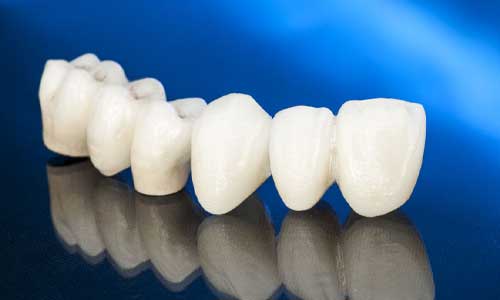Crowns and Bridges
Missing teeth can have a significant impact on your appearance: drooping corners of the mouth, no support for the lips. Create functionality issues such as improper speech, due to missing front teeth. Difficulty chewing and eating. You can replace missing teeth by different treatment options. Crowns and Bridges are one of the solution to these issues.
What are
Dental crowns and bridges?
Crowns and Bridges are fixed prosthetic devices. Unlike dentures, which need to be removed for cleaning, all crowns and most bridges function as fixed prosthetics. We might recommend the use of either in different scenarios.

Looking for dental crowns & bridges specialist in Browns Plains?
We help you find the right solution for missing teeth. But it’s also important to understand the treatment options that are available to you. Crowns and Bridges are good options to restore your imperfect or missing teeth.
They are a fixed solution to missing or damaged teeth. This is a restorative procedure. It uses prosthetic devices not only to restore your smile to its natural state but also improve the function of your teeth. Often, a crown is used when the tooth structure is damaged or fractured. A dental bridge on the other hand finds application especially when one or more teeth are missing.
Dental Crowns

Crowns and Bridges at Browns Plains
A crown, as the name implies, functions as a cover or a cap for a damaged tooth which cant be restored by a simple filling. When cemented into place, a crown encases the entire visible portion of a tooth.
Most importantly, different types of crowns are available, some of which include stainless steel, metal alloys, porcelain-fused-to-metal, all-resin, and all-ceramic. The one that works best for you depends on multiple factors, which you can discuss with us.
You might need a crown for different reasons, which include:
- Covering a tooth that has undergone root canal treatment
- Covering a dental implant
- Restoring a fractured tooth
- Protecting a weak tooth from fractures
- Replacing a large filling in the absence of enough tooth
- Covering a poorly shaped or discoloured tooth
- Attaching a bridge
Dental Bridges
A dental bridge, quite literally, works in bridging the gap between existing teeth. A bridge can come with two or more crowns that cover teeth on both sides of the gap, with the false tooth or teeth placed in between. The teeth on the side that anchor the bridge are referred to as abutment teeth.
The use of bridges prevents existing teeth from moving out of position, which tends to happen because of the space left by missing teeth. Most importantly, a bridge helps to distribute the force properly when you bite and chew. In some cases, missing teeth have an adverse effect on speech, which bridges can address effectively. Above all, bridges can also help your face maintain its shape and therefore, restore your smile.
Bridges come in three main types, which include traditional bridges, cantilever bridges, and Maryland bonded bridges. Usage depends on the scenarios.
Dental Crowns and Dental Bridges: The Process
A dentist who knows how to complete dental crowns and bridges in a way that looks natural is important when getting these procedures done. At Brite Dental Group, we strive to make our patients as comfortable as possible while doing so. Both procedures follow a similar process. It is necessary to take an impression of the teeth first so that a dental lab can make the new crown or bridge.
We prepare a tooth before placing a dental crown around it. To allow the new crown to surround the tooth without pushing other teeth out of alignment, a portion of the enamel will have to be removed. A temporary crown will then be attached to the tooth using cement ,once the preparation is complete. While waiting for a permanent crown to be created in the lab, patients typically wear temporary crowns. Since the temporary is designed to come off, you should be careful what you eat and how you brush your teeth during this time.
After the dental restoratives are completed, patients return to our surgery to have the temporaries removed and the permanent ones bonded. In dental crowns, we secure the cap around the tooth and complete it with dental bonding. A bridge consists of two crowns attached to the teeth surrounding the one that is missing. These two crowns anchor the synthetic “bridge” and make it as durable as possible.
After the Procedure
After receiving dental restoratives, your teeth will be somewhat sensitive. It is for this reason that temporary crowns are necessary while you wait for a permanent one to be made. Wearing a crown protects and surrounds the tooth. This means that you can eat your favorite foods without fear of discomfort regardless of how damaged your tooth was.
By restoring the functionality of your mouth with a crown, you can eat, drink and speak normally again. For those with severely sensitive teeth, cracked or chipped teeth or root canals, this is ideal. As with a bridge, you can eat and speak normally without worrying about your new tooth becoming loose or falling out. People with active lifestyles and who don’t want to be constrained by their teeth will benefit from both of them. Schedule an appointment with us to discuss your options and find out if the procedure is right for you by calling 0434 921570. The Brite Dental Group makes it easier for patients in Browns Plains and the surrounding suburbs achieve that beautiful and functional smile.
Frequently Asked Questions
What Is the Difference Between Crowns and Bridges?
Crowns cover existing teeth, while dental bridges fill in the gap caused by missing teeth. The bridge consists of one or more false teeth and one crown at each end. A bridge is attached to your existing teeth on either side of the gap in your smile, using the crowns as anchors.
Who Is a Good Candidate for Dental Bridges?
Bridges can be beneficial to someone who has one or two missing teeth and wants a semi-permanent solution. With the bridge, the patient will be able to process food more easily, maintain the structure of the jawline, and smile with confidence. For a crown to be supported, the abutment teeth must be healthy. Generally, a person who is a good candidate for a crown is also a good candidate for a bridge.
Can I use a crowned tooth like a natural tooth for eating everything?
Yes, without a doubt! Crowned teeth can be used just like natural teeth.
When is a crown required?
The crown only covers the surface of the tooth, so the inner parts must be healthy to support it. In order to determine whether the tooth can receive a crown, a dentist must take X-rays inside the tooth. Crowns are also suitable for patients who have had root canal therapy.
What is the treatment process for crown & bridge?
An accurate impression (measurement) is made of the tooth/teeth to be crowned, then it is sent to a dental laboratory. The laboratory fabricates the crown or bridge based on the dentist's specifications. Following this, the prosthesis is cemented in the mouth of the patient.
How long do crowns last?
The average lifespan of a crown is five to ten years, according to research.
A glossary of cosmetic dentistry terms
Dental Crown
A dental crown is a cap that covers a damaged tooth. Using crowns, you can protect, cover, and restore the shape of your teeth.
Dental Bridge
A dental bridge permanently replaces missing teeth with false teeth. The bridge is attached to the teeth on either side of the gap.
Implant-supported Bridge
Similar to a regular bridge, an implant-supported bridge is supported by dental implants on either end rather than by natural teeth.
PFM Crowns
A porcelain fused to metal crown, or PFM crown, is fabricated with a porcelain exterior and a metal alloy interior.
Zirconia Crowns
Zirconia is a white solid ceramic glaze that combines metal’s strength with the aesthetic, tooth-like appearance of ceramics.
Porcelain Crowns
Porcelain crowns are designed to look like your natural teeth, which is why they are more aesthetic than metal-based crowns.

Family Dentist in Browns Plains
This family dentist in Browns Plains also provides a full range of dental services including root canal treatment, fillings, extraction of teeth, cleaning and polishing, dental implants, dentures, veneers, crowns and bridges, tooth whitening, custom fitted mouth guards, as well as preventive dentistry for children.
Call us to schedule your comprehensive dental exam now at +61 434 921 570.